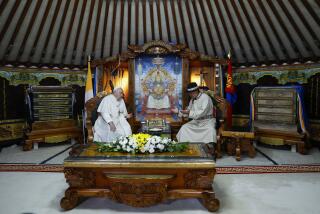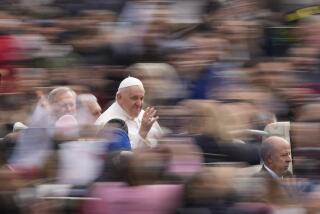He Will Look at Impoverished Bolivia’s Development Woes : In Lofty La Paz, Pope Displays No Discomfort
- Share via
LA PAZ, Bolivia — Taking precautions against altitude sickness, Pope John Paul II arrived Monday in La Paz, the world’s highest national seat of government.
In an arrival speech, the pontiff said he plans to take a close look at this impoverished country’s problems of underdevelopment.
The Pope, 67, will stay in La Paz until this evening, when he is scheduled to leave on a four-day tour of six other Bolivian cities. It is the Pope’s first trip to Bolivia, part of his ninth trip to Latin America.
El Alto, the airport where John Paul II arrived Monday, is on an Andean plain more than 13,000 feet above sea level and 1,000 feet higher than this capital city. El Alto means “the high one.”
Visitors not accustomed to the altitude often need tanks of oxygen and pills to help their breathing when they arrive.
The Pope, however, spent an hour in airport ceremonies without showing signs of discomfort. He gave his speech in a firm voice, then greeted more than 100 officials, church leaders and others.
But instead of walking along the reception line, he let the line come to him. And instead of taking a long walk around the crowd that lined the tarmac, he rode slowly in a jeep.
A Vatican press aide said the Pope had been advised to walk slowly as a precaution. The aide, Juan Pedro de Gandt, said there was little concern that the Pope might have difficulties with the altitude.
“Since he has been a man of the mountains, it presented no problem for him,” De Gandt said. “He has shown no sign of weakness or anything.”
Special “papal guards,” students in yellow shirts and white trousers, stood at attention along the road from the airport as the Pope departed. Hundreds of thousands of Bolivians turned out to greet him, lining the long, curving highway that descends from El Alto to the center of La Paz.
President Victor Paz Estenssoro, 81, met the Pope at the airport. The two men will talk in the presidential palace today. As homage to the Pope’s visit, Paz issued a decree granting amnesty to all prisoners who are in jail because they are unable to pay fines.
An austerity program imposed by Paz’s government to control inflation has resulted in waves of protest demonstrations and strikes around the country, which is South America’s poorest.
The Pope said he would spend his five days in Bolivia “looking closely at the difficulties of this beloved country, beaten down by poverty, a lack of greater development and resources, a lack of solidarity and injustice.”
At a meeting later with Bolivian bishops, a three-page statement by the bishops that was scheduled to be read was instead handed to the Pope with the explanation that they did not want to tire him out on his first day in La Paz.
The statement contained a strong complaint about social and economic conditions in this country, calling them a “situation of injustice in which thousands of brothers are sunken with degrading misery and inhumane unemployment.”
A 12-day hunger strike by thousands of students and labor union activists ended Saturday after mediation efforts by the Bolivian Catholic Church.
Church leaders, who had feared that the hunger strikes would disrupt the Pope’s visit, expressed relief when it ended. But they emphasized that the church was not turning its back on the hardships behind the protests.
More to Read
Sign up for Essential California
The most important California stories and recommendations in your inbox every morning.
You may occasionally receive promotional content from the Los Angeles Times.













